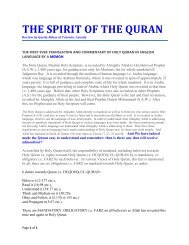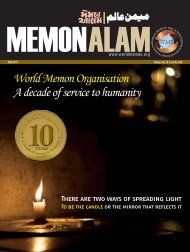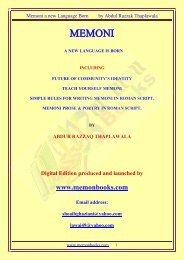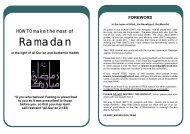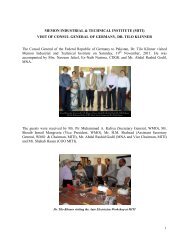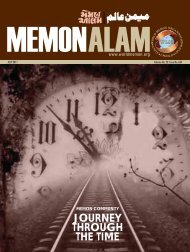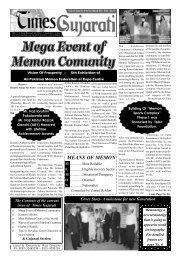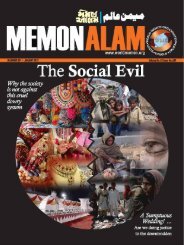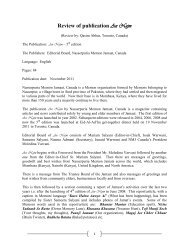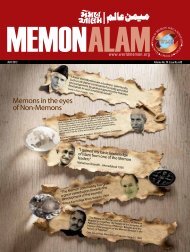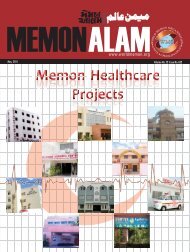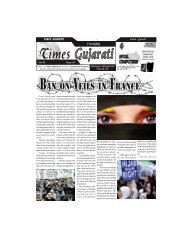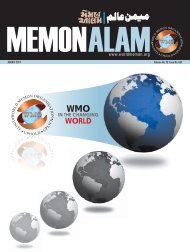February 2012.indd - World Memon Organization Pakistan Chapter
February 2012.indd - World Memon Organization Pakistan Chapter
February 2012.indd - World Memon Organization Pakistan Chapter
- No tags were found...
Create successful ePaper yourself
Turn your PDF publications into a flip-book with our unique Google optimized e-Paper software.
IMMORTAL PERSONALITIESSETH HAJI ABDULSATTARThe old generation of <strong>Memon</strong>s took politicsas part of their religion and Sattar Seth wasa living example of this. He belonged to theKutchi <strong>Memon</strong> community. His forefatherswent to Malabar, South India, for businesspurposes. Haji Sattar Seth was born therein 1894. He received his primary and highereducation there and also performed Hajwith his father in 1906. He stayed in SaudiArabia for two years and acquired knowledgeof Islam as well as Arabic language.He again went for Haj with his father in1914 and again stayed there for two yearsfor educational purpose. He started hispolitical career by taking part in the KhilafatMovement. He was regarded as one of theclosest companions of Maulana ShaukatAli. He was elected joint Secretary of theKerala Muslim League. In 1935, he waselected member of the Legislative Assemblywith a comfortable margin. In 1946, he wasre-elected to the Legislative Assembly andbecame Chief Whip of the Muslim LeagueParliamentary Party. He served as a memberof the Central Working Committee ofthe Muslim League from 1938 to 1948. Afterindependence, he remained a member ofthe Indian Constituent Assembly till 1948.He took part in GATT Conference held atGeneva as a representative of India. He washeld in high esteem by the Muslim Leaguecircles which is evident from the fact thatthe Quaid-e-Azam invited him in 1948to come to <strong>Pakistan</strong> and appointed himambassador of <strong>Pakistan</strong> in Egypt in whichposition he served for 3 years. Besides, herendered services as <strong>Pakistan</strong>i diplomat inSaudi Arabia. In 1957, he was appointedHigh Commissioner of <strong>Pakistan</strong> in SriLanka where he served for five years. Hecame back to <strong>Pakistan</strong> in 1962 and retiredfrom Politics. He had command of English,Gujrati, Urdu, Malayalam, Tamil and Arabiclanguages. His services in Egypt, SaudiArabia and Sri Lanka proved much usefulbecause of his knowledge of Arabic andTamil Languages.During <strong>Pakistan</strong> Movement, he publishedan Urdu weekly ‘Hind’. At the time ofmigrating to <strong>Pakistan</strong> his business was flourishingin Malabar. But, on a telephonic callfrom the Quaid-e-Azam, he left all that immediatelyand reached <strong>Pakistan</strong> and startedperforming the duties assigned to him.Whenever he was approached for award ofa title, he declined politely. He never submittedany claim for his property worth croresof rupees that he had left in India whilecoming to <strong>Pakistan</strong>. So simple was his lifestyle that even in his declining age, he wentto markets for buying things of daily use.It is unfortunate that leaders like A. SattarSeth, who came here sacrificing all theirbelongings for the cause of <strong>Pakistan</strong>, have beenforgotten. Not only this, but they were consignedto marginal positions even during their life time.MR. A.K. SUMARMr. A.K. Sumar was a leading businessmanand philanthropist of the community. Hewas much known for the longest ever tenureof service in his capacity as the Presidentof the All <strong>Pakistan</strong> <strong>Memon</strong> Federation. Hestruggled a lot to eliminate the ill customsof the community. He started his politicalcareer in 1941 when he became the organizingSecretary of Bombay Provincial MuslimStudents Federation.After partition, he came to Karachi andgave attention towards business of cloth. Heserved the Textile Merchants Association asits Secretary for three years and five yearsas its President. In 1961, he was electedPresident of Karachi Chamber of Commerce& Industry. In 1965, he was electedin the Parliament and became Chairman ofNational Press Trust.In 1969, he became President of the All<strong>Pakistan</strong> <strong>Memon</strong> Federation and resignedfrom that post in 1976.ABDUL RAZZAK TASTYHe was a prominent businessman and agenerous philanthropist, extending assistanceto various social welfare activities. Hisdonations for various humanitarians causerun into tens of millions of rupees and healways looks forward to donating morefunds to new and deserving cause.HUSSAIN QASIM DADABorn in Bantva in 1867, he went to schoolat the age of nine and studied up to theschool level certificate, which was up toseventh class in Gujrati.His father had a small stationery shop.Young Hussain became a teacher at aschool in Bantva and earned Rs. 3 permonth. After one year, he taught in anothervillage as an acting head master at a monthlysalary of Rs. 12. In 1894, he accepted ajob, which took him to towns in South Indiaand finally joined in the service of SulemanKasim Mitha at Tell cherry selling salt forthe employer. Having worked for Mitha, hedecided to start an independent venture inthe same line and in the same place with aloan from his previous employer. Luck favoredhim and in the very first year he madea profit of Rs. 3,000. Later on he expandedhis business in the towns of Kerala state.His success was due to low expenses, hardwork, a low margin of profit and a largeturn over.Nothing succeeds like success. He wasable to extend his business in many placesof India, Burma, Ceylon, French Indo-China, Singapore and Siam. By that timehe was a successful and well-known bigbusinessman dealing in most items like foodgrains, cotton yarn, jute and related items.He was now Hussain Seth. He shifted hishead office to Bantva.Now he started to devote his time in thefield of community service also. He had aneye for constructing houses, taking care ofwind and light direction and constructedmany buildings in his family complex. Hebecame the Chairman of the ReceptionCommittee of the first <strong>Memon</strong> Conferenceheld in Rajkot. Many British dignitaries,ruling princes and the Quaid-e-Azam alsostayed with him as his house guest.Coming to <strong>Pakistan</strong> at an age of eighty,he purchased new properties and createda family trust. His interest in designingbuildings and supervising their constructionhelped him to construct suitable homes forhis family members. Having a soft spot fororphans, he started one orphanage in Karachialso for which he created a special trustwith an amount of Rs. one million.A most remarkable incident worth emu-12MEMON ALAM FEBRUARY 2012



